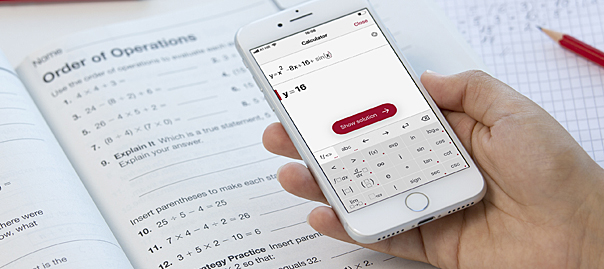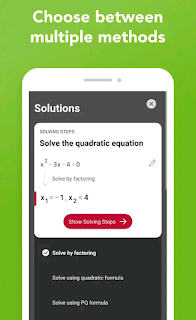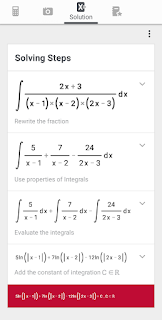Mathematics, calculations. Laziness for some, terror for others. For both cases, a solution emerges on the horizon: a British company called MicroBlink created PhotoMath, an app that uses your smartphone’s camera to solve mathematical problems and shows how to get to the result.
The application uses image recognition technologies to identify the numbers and symbols that characterize the problem: division, multiplication, square brackets and so on. It’s like a Word Lens, but focused on equations.
All you need to do is open PhotoMath and position the camera above the problem to be solved (in a book, for example). The result is displayed almost instantly. If you want to know how the problem is solved, you have the option to consult a step-by-step.
The application works well, both in character recognition and in solving problems, but it has some limitations: the identification of handwritten content is flawed and, so far, only simpler accounts can be solved, such as basic arithmetic, fractions and linear equations.
Limits, derivatives and integrals? One day, who knows: MicroBlink’s plan is to make PhotoMath progressively more comprehensive.
Photomath has over 100+ million downloads, and billions of problems are solved every month! Photomath is FREE and works without wi-fi.
In general, the application is very interesting but makes us question the effects on teaching. For example, what motivation would a student have to learn math if there is a tool that does the tasks for him?
Well, MicroBlink promotes the application as a learning aid tool. In fact, solving the problem step by step is of great help when doubts appear halfway. The good or bad use of the tool is therefore up to each person.
- How to turn your old phone into a security camera
- How to Identify the Owner of a Phone Number
- 26 Best Math Solver Apps for iOS and Android
What is Photomath?
Photomath is a mobile application described as a “camera calculator“, which utilizes a phone’s camera to recognize mathematical equations and display the step-by-step solution on screen. It is available for free on Google Android and iOS.
The application was released in 2014 by Microblink.
Basically, with Photomaths you can Scan, Solve and learn math problems.
It is free to use but you can boost your learning by upgrading to Photomath Plus.
How does Photomath work?
Photomath can scan printed text and handwritten math problems using your device’s camera or type and edit equations with the scientific calculator.
Then it breaks down every math problem into simple, easy-to-understand steps so you can really understand every method, and core concept and can answer math problems confidently.
The Photomath team partners with veteran math educators and teachers worldwide to ensure they are utilizing the most effective, contemporary teacher methodologies in the Photomath engines.
Benefits of Photomaths
- Learn how to solve Math problems yourself
- Solve your homework in seconds
- Be ahead of classwork
Math Topics you can Solve using Photomath
Basic Math/Pre-Algebra: arithmetic, integers, fractions, decimal numbers, powers, roots, factors
Algebra: linear equations/inequalities, quadratic equations, systems of equations, logarithms, functions, matrices, graphing, polynomials
Trigonometry/Precalculus: identities, conic sections, vectors, matrices, complex numbers, sequences and series, logarithmic functions
Calculus: limits, derivatives, integrals, curve sketching
Statistics: combinations, factorials.
Key Features
- Scan textbook (print) and handwritten problems
- Scientific calculator
- Step-by-step explanations for every solution
- Multiple solving methods
- No internet connection is required to use
- 30+ languages supported
- Interactive graphs
How to use Photomath to Solve any Math Problem
- Download Photomath from Playstore or App Store,
- Open the application,
- Sign in with your Google Account or Facebook Account,
- Scan a math problem with the camera or type in the math question with the in-built scientific calculator,
- The solution and final answer to your math problem will be shown to you,
- Then, Navigate to Solution to see the solving steps and graph.
Is this application helpful? Please leave a comment below telling us what you think about this application and don’t forget to also share this post with your friends and students you know around you.
Cheers!!



